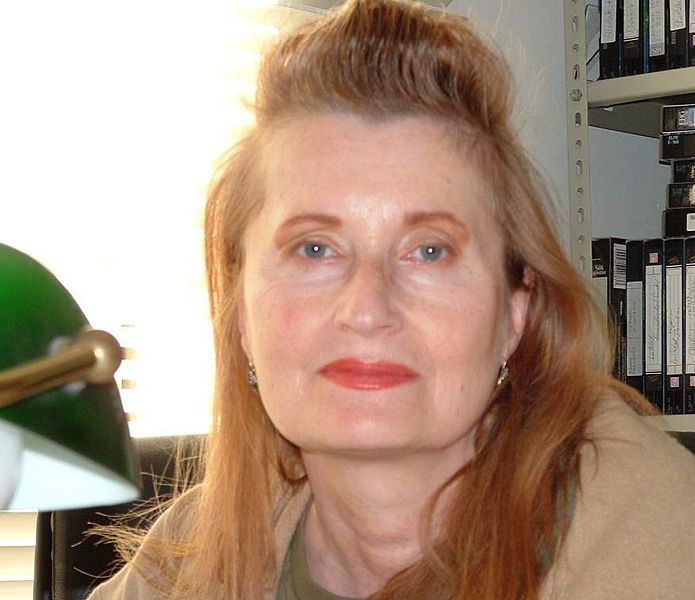Elfriede Jelinek
Elfriede Jelinek (born 20 October 1946) is an Austria feminist playwright and novelist. She was awarded the Female Nobel Prize Laureates in 2004 for her “musical flow of voices and counter-voices in novels and plays that, with extraordinary linguistic zeal, reveal the absurdity of society’s clichés and their subjugating power.  “
“
Early Life
Jelinek was born in Mürzzuschlag, Styria. As a child, Elfriede suffered from what she considered an over-restrictive education in a Roman Catholic convent school in Vienna. Her mother planned a career as a musical Wunderkind for Elfriede. From an early age, she was instructed in piano, organ, guitar, violin, viola and recorder. Later, she went on to study at the Vienna Conservatory, where she graduated with an organist diploma. Jelinek also studied art history and drama at the University of Vienna. However, she had to discontinue her studies due to an anxiety disorder that prevented her from following courses.
In the early 1970s, Jelinek married Gottfried Hüngsberg.
Political Activism
Jelinek was a member of Austria’s Communist Party from 1974 to 1991. Jelinek became a household name during the 1990s due to a public passionate dispute with Jörg Haider’s far-right Freedom Party. Following the 1999 National Council elections and the subsequent formation of a coalition cabinet consisting of the Freedom Party and the Austrian People’s Party, Jelinek became one of the new cabinet’s most vocal critics. Citing the Freedom Party’s alleged nationalism and authoritarianism, many European and overseas administrations swiftly decided openly to ostracize Austria’s administration. The cabinet construed the sanctions against it as directed against Austria as such and attempted to prod the nation into a national rallying (Nationaler Schulterschluss) behind the coalition parties. This provoked a temporary heating of the political climate severe enough for dissidents such as Jelinek to be accused of treason by coalition supporters.
Writing Career
Jelinek started writing poetry at a young age. She made her literary debut with the collection Lisas Schatten in 1967. Domestically, her works have been severely criticised, in part because of the brutal exposure of sexuality, male-female relationships and violence, and also in part because of her political affiliations.
Prevalent topics in her prose and dramatic works are female sexuality, its abuse and the battle of the sexes in general. Texts such as Wir sind Lockvögel, Baby! (We are Decoys, Baby!), Die Liebhaberinnen (Women as Lovers) and Die Klavierspielerin (The Piano Teacher) showcase the brutality and power play inherent in human relations in a style that is at times ironically formal and tightly controlled. According to Jelinek, power and aggression are often the principal driving forces of relationships. Her provocative novel Lust contains graphically-delineated descriptions of sexuality, aggression and abuse. It received poor reviews by many critics, some of whom considered it little more than pornography, but was considered misunderstood and undervalued by others, who noted the power of the cold descriptions of moral failures.
In her later work, Jelinek has somewhat abandoned female issues to focus her energy on social criticism in general and Austria’s difficulties to owning up to its Nazi past in particular; an example is Die Kinder der Toten (The Children of the Dead).
Distinctions and Controversy
Jelinek’s novel Die Klavierspielerin (The Piano Player) was filmed with title The Piano Teacher by Austrian director Michael Haneke, with French actress Isabelle Huppert as the protagonist.
When her Nobel Prize was announced in 2004, Jelinek questioned whether she had not been awarded the prize mainly for “being a woman” and suggested that among authors writing in German, Peter Handke whom she praises as a “living classic”, would have been a more worthy recipient.
Jelinek was criticized for not accepting the prize in person; instead, a video message was presented at the ceremony. She confessed that she suffered from agoraphobia and social phobia. Her video message apologised for her absence: “I would also very much like to be in Stockholm, but I cannot move as fast and far as my language.”
See Also
External Links & Sources
- http://www.elfriedejelinek.com/
- “Wife of incest dad under suspicion”. The Australian, May 5, 2008.
- http://nobelprize.org/nobel_prizes/literature/laureates/2004/jelinek-interview.html
- “Member’s abrupt resignation rocks Nobel Prize community”. Boston Globe, October 12, 2005.
- BBC Synoopsis: http://news.bbc.co.uk


